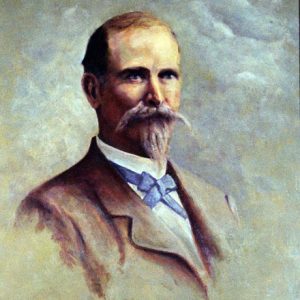calsfoundation@cals.org
The Aftermath of the Civil War in Arkansas
Written by the ninth governor of Arkansas, Powell Clayton, The Aftermath of the Civil War in Arkansas recounts the period immediately after the end of the conflict in 1865. Published in 1915 after Clayton’s death the previous year, the work details the Reconstruction efforts of Unionists in charge of the state government.
A Pennsylvania native, Clayton trained as a civil engineer in Delaware before moving to the Kansas Territory in 1855. He won election as the city engineer for Leavenworth, Kansas, in 1860. Joining the First Kansas Infantry in May 1861, Clayton led his company at the Battle of Wilson’s Creek, Missouri, in August of that year. He transferred to the Fifth Kansas Cavalry and received a commission as a lieutenant colonel in February 1862.
Clayton commanded the regiment in the Arkansas Delta, most notably as part of a brigade at the Battle of Helena and during the Federal capture of Little Rock (Pulaski County) in September 1863. The following month, Clayton received command of the Union outpost at Pine Bluff (Jefferson County) and held that post for the remainder of the war, participating in the Action at Pine Bluff on October 25, 1863, and supported the Union forces of the Camden Expedition in the spring of 1864.
Promoted to the rank of brigadier general, Clayton remained in Arkansas after the war. During his service, he had leased a plantation and earned enough money from the venture to begin purchasing land. He became involved with the organization of the Republican Party in Arkansas, receiving the party’s nomination for governor in 1868 and winning the election. He later served as a U.S. senator representing the state and as ambassador to Mexico.
The work is arranged into seventeen chapters. Opening with a foreword he composed shortly before his death in August 1914, the work continues with a recounting of Clayton’s inauguration day in 1868. The following chapter explores the background of Isaac Murphy during his term as governor and the efforts by Unionists in the state to reconstitute a government for recognition by the federal government. Additional chapters include information on the efforts of Clayton’s administration to fight against the Ku Klux Klan in the state. These efforts led to the Militia Wars of 1868–1869.
Clayton also discussed the Brooks-Baxter War in the work and detailed the improvements that his administration made in the state, most notably with education. Clayton worked with the legislature to create a true system of free schools in the state, with the institutions being segregated by race. He was also instrumental in founding what is now the University of Arkansas (UA) in Fayetteville (Washington County), although the bill to create the institution was passed after he left the governorship for a seat in the U.S. Senate.
The work includes numerous footnotes and additional sources, making it helpful for researchers. The book continues to be a useful resource for anyone interested in Arkansas during the Reconstruction period.
For additional information:
Burnside, William H. The Honorable Powell Clayton. Conway: University of Central Arkansas Press, 1991.
Clayton, Powell. The Aftermath of the Civil War in Arkansas. New York: Neale Publishing Company, 1915. Online at https://www.loc.gov/item/15004463/ (accessed November 20, 2024).
David Sesser
Southeastern Louisiana University
 Early Twentieth Century, 1901 through 1940
Early Twentieth Century, 1901 through 1940 Literature and Authors
Literature and Authors Powell Clayton
Powell Clayton 



Comments
No comments on this entry yet.